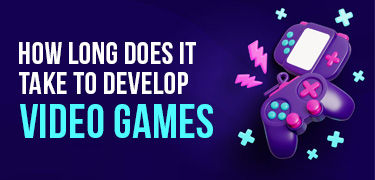Creating a video game from scratch is more complex than making a concept and miraculously turning it into a playable version the following day. It's a difficult procedure that requires creativity, technical expertise, and a lot of time. But how much time are we talking about? Let's look at the phases, and considerations that go into video game creation.
The time required to make a game varies greatly based on numerous factors. A tiny independent project can take a few months to a couple of years, but large-scale blockbuster releases might take three to five years or even more. Mobile game creation may be faster, but it still requires a lot of labour.
Making a game like a basic puzzle app might take a team many months. However, you'll need to work with a huge team of game developers to create the next epic, open-world adventure for several years.
Factors That Impact Game Development Time
Several factors impact the time it takes to build a game. Here are some of the more important ones:
1. Size and Complexity of the Game:
One of the most apparent considerations is the game's size and breadth. A tiny mobile game can be developed quickly, but a large, story-driven console or PC game will take considerably longer. Game creators will take longer to assemble complicated game mechanics, visuals, and features.
For example, a small platformer with primary stages may be completed in less than a year. Still, a large RPG with complex locations, numerous characters, and complicated gameplay mechanics could take several years.
2. Team Size and Skill Set
Another key factor is the size and experience of the development team. A solo video game developer can take much longer to make a game than a large team with diverse expertise. If the team has experienced game developers skilled in various aspects of the process, they can work more efficiently and speed up the timeline.
On the other hand, if the team is small or lacks certain skills, it can need to outsource parts of the game or spend extra time learning new techniques, which can drag out the process.
3. Platform & Technology
The platform on which the game is being built also influences the development time. Mobile game production may be faster than making a console or PC game, although this depends on the game's complexity. Mobile games typically feature less complex visuals and simpler controls, which can shorten production time. However, ensuring that a mobile game runs well across several devices and operating systems may be difficult and time-consuming.
It adds another complexity if the game is being created for numerous platforms. Game makers must guarantee that the game runs smoothly on all platforms, which can lengthen the timetable.
4. Development Phases:
Game creation often involves numerous phases, each of which takes time. Here's a general breakdown of the major stages:
Pre-production: It is the planning process during which the concept is conceived, stories are written, and prototypes are built. Depending on the game's complexity, this might take many months.
Production: This is where the actual game is created. It entails programming, designing, and producing the art and sound. Production time ranges from a few months for tiny mobile games to many years for major ones.
Testing & QA: No game is flawless on the first attempt. The testing step guarantees that the game works smoothly and is bug-free. Depending on the game's magnitude, this might take a few weeks to many months.
Post-Production: Even after the game is published, developers frequently devote more effort to correcting issues, delivering updates, and potentially working on downloadable content (DLC) or expansions.
5. Budget & Resources
The budget also influences how long it takes to create a game. More money enables game makers to recruit more people, get better tools, and accelerate the process. In contrast, indie developers sometimes have fewer budgets and resources, which might cause delays.
Video game production may move faster for large studios with plenty of resources, but even they might have delays owing to unanticipated obstacles such as technological hurdles or scope modifications.
6. Revisions and Changes
Game creation is rarely straightforward from inception to completion. Game creators frequently need to make changes as they go. Sometimes, brilliant ideas in the planning phase don't work out in practice, and developers have to start over, which might add weeks or months to the schedule.
Additionally, testers' comments might result in major adjustments. If a basic gameplay feature does not appeal to the public, developers can need to rewrite it, which can increase the production time.
7. Mobile Game Development vs. Console/PC Development
Mobile game creation is frequently faster than developing consoles or PCs, but it still presents obstacles. Mobile devices have limited processing power and memory, so game producers must carefully optimise their games. Additionally, mobile game creators must consider the wide range of devices on the market and guarantee that their games function correctly.
However, mobile game development schedules can vary from a few months for basic apps to more than a year for big games with rich features.
8. Industry Trends:
Indie Game Development: The rise of indie game studios and the success of indie games have led to a more diverse and innovative gaming landscape.
Mobile Gaming: The popularity of smartphones and tablets has fueled the growth of mobile gaming, with many successful games being developed exclusively for mobile platforms.
Cloud Gaming: Cloud gaming services allow players to stream games without the need for powerful hardware, making gaming more accessible and flexible.
Virtual and Augmented Reality: VR and AR technologies offer new immersive gaming experiences, opening up new possibilities for game developers.
E-sports: Competitive gaming has become a major industry, with professional players and tournaments attracting large audiences.
Conclusion:
When you decide to make a game, be prepared for a journey that might take months or even years. Patience, tenacity, and adaptability are required when developing a game. The timeframe is determined by various factors, including the game's size and complexity, the team's talents, the platform, and available resources.
Whether you're a solitary video game developer working on a passion project or part of a bigger team looking to produce the next big hit, understanding the development process and timeframe is critical for managing expectations. The time and work you invest into developing your game may pay off with a finished product that entertains, challenges, and captivates people worldwide.
No matter how long it takes, keep in mind that every excellent game is the result of a dedicated, creative, and collaborative team of game developers. And once your game is ready for people to play, all those hours spent behind the scenes will have been worthwhile.






